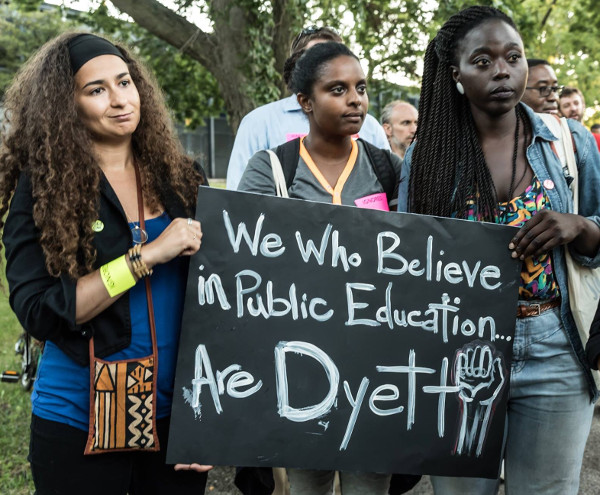
PHOTO/SARAH JANE RHEE
CHICAGO, IL — Twelve people—teachers, parents, grandparents—began a hunger strike in early August to get Chicago Public Schools to re-open Walter Dyett High School as a neighborhood public school, open to all, with a focus on “Global Leadership and Green Technology.” The Coalition to Revitalize Dyett High School, comprised of the Chicago Teachers Union, Kenwood Oakland Community Organization (KOCO), Teachers for Social Justice, University of Illinois College of Education, the DuSable Museum of African American History and others crafted this proposal. Chicago Public Schools blocked every effort by the community, which provoked the hunger strike. On the 33rd day of the strike, September 19, the strikers held a press conference to announce victory. They stopped privatization of this school and prevailed in getting an open enrollment traditional public school.
Jitu Brown, one of the hunger strikers and a leading KOCO educational activist, had declared, in the midst of the strike: “I don’t want people to say I fought the good fight. I’m in this fight to win!” He echoed this on day 23, when the strikers marched from Operation PUSH to President Obama’s Chicago residence to convince Washington to put pressure on the Mayor. The strikers initially rejected Chicago Public Schools’ first offer, on day 18, to reopen Dyett as an arts based school. Then, on day 25, three more Chicagoans joined the strike.
The hunger strike is a movement born out of complete desperation. This is how Anna Jones, one of the strikers, put it: “ . . . my children have been robbed of their education. Our schools and communities are impoverished and becoming more impoverished due to the misappropriation of tax payer’s dollars as a plan to wipe-out low-income neighborhoods intentionally for personal profit and gain. “WE PAY TAX DOLLARS—WE’VE INVESTED IN EDUCATION JUST LIKE THE UPPER CLASS.”
What Anna Jones said about her community is replicated in working class communities across the country. Destruction of the schools is only part of the picture, as jobs disappear, swallowed up by advances in automation. As workers become superfluous to a system that thrives on profit, the ruling class will neither feed them nor educate them. The bones capitalists used to throw us to keep us divided are becoming more difficult to get, as the Dyett experience has shown. The only sacred thing to the capitalists now is the protection of their private property, and that includes turning everything public into private hands, even the schools.
What is at stake in this fight is much more than Dyett. The fight to make the government responsible for services to the community is the germ to reorganize a cooperative society for the needs of the people. We can’t go school by school, community by community, to achieve what we need. That is the significance of people in other cities joining the hunger strike. That is the significance of going to Washington to demand education justice. National full funding of public education with local implementation according to the needs of the people could resolve this impasse and end the destruction of public education.
